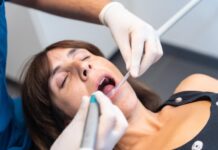Preventive dental care plays a crucial role in maintaining optimal oral health. By adopting proactive measures, individuals can prevent dental problems before they occur. In this article, we will explore the significance of preventive dental care, common practices, and its long-term benefits.
1) Importance of Preventive Dental Care
The importance of preventive dental care encompasses a range of practices aimed at avoiding oral health issues such as cavities, gum disease, and tooth loss. Regular dental check-ups, along with daily oral hygiene routines, form the foundation of preventive dental care.
By visiting your dentist at least twice a year, potential problems can be detected early, ensuring timely intervention. During these visits, dental professionals perform comprehensive examinations, including X-rays, cleanings, and screenings for oral cancer. Identifying issues at their initial stages allows for simpler, less invasive treatments, ultimately saving time and money.
2) Key Practices of Preventive Dental Care
- Brushing and Flossing: Brushing your teeth twice a day with fluoride toothpaste is essential for removing plaque, bacteria, and food particles. Flossing, done daily, helps clean the areas between teeth where a toothbrush cannot reach, reducing the risk of gum disease and tooth decay.
- Healthy Diet: Maintaining a balanced diet that is low in sugar and acidic foods can prevent tooth decay. Limiting sugary snacks and beverages helps minimize the production of harmful acids that erode tooth enamel.
- Fluoride Treatment: Fluoride strengthens tooth enamel, making it more resistant to decay. Dentists may recommend fluoride treatments or the use of fluoride toothpaste or mouthwash to enhance protection against cavities.
- Mouthguards: For those involved in sports activities, wearing a mouthguard can protect teeth from injuries and fractures caused by impact.
- Tongue Cleaning: Cleaning the tongue is an often-overlooked aspect of oral hygiene. Bacteria can accumulate on the surface of the tongue, leading to bad breath and potential oral health problems. Using a tongue scraper or a soft-bristled toothbrush, gently scrape or brush the tongue from back to front to remove the bacteria and debris.
- Limiting Tobacco and Alcohol Use: Tobacco use and excessive alcohol consumption can significantly impact oral health. Both substances increase the risk of oral cancer, gum disease, tooth decay, and the loss of teeth. Stopping using tobacco and moderating alcohol intake can greatly improve oral health and overall well-being. i. Stress Management: Stress can contribute to teeth grinding (bruxism) and temporomandibular joint (TMJ) disorders, which can cause tooth damage and jaw pain. Managing stress through techniques like exercise, meditation, and relaxation exercises can help protect your oral health.
3) Long-Term Benefits of Preventive Dental Care
Engaging in preventive dental care practices brings numerous long-term benefits. Firstly, it helps prevent costly and extensive dental treatments that may arise from neglected oral health. Regular check-ups enable dentists to identify and address issues early on, preventing further damage.
Secondly, preventive care contributes to overall well-being by reducing the risk of systemic diseases associated with poor oral health. Conditions like cardiovascular disease, diabetes, and respiratory infections have been linked to oral infections and inflammation.
Lastly, maintaining good oral health through preventive care promotes a confident smile and improves self-esteem. Fresh breath, healthy teeth, and gums contribute to a positive self-image and better interpersonal relationships.
4) Additional Considerations for Specific Age Groups
Children and Adolescents
Establishing good oral hygiene habits early in life sets the foundation for a lifetime of dental health. Parents should encourage proper brushing and flossing techniques, supervise oral care, and ensure regular dental visits. Fluoride treatments and dental sealants are particularly beneficial for this age group.
Adults
Maintaining preventive dental care practices becomes increasingly important as we age. Regular check-ups, screenings for oral cancer, and addressing issues such as tooth sensitivity and gum disease are essential. Adults may also consider orthodontic treatments or restorative procedures to maintain oral health and functionality.
Older Adults
As we age, the risk of tooth loss, dry mouth, and gum disease increases. Older adults should maintain regular dental visits, practice thorough oral hygiene, and address age-related dental issues promptly. Dentures and dental implants may be considered to restore missing teeth and enhance the quality of life.
Prioritizing preventive dental care is vital for achieving and maintaining excellent oral health. By incorporating simple yet effective practices like regular dental visits, proper brushing and flossing techniques, and a healthy diet, individuals can minimize the risk of dental problems and ensure long-term well-being. Taking proactive steps to prevent oral health issues not only saves money and time but also enhances the overall quality of life. Remember, a healthy smile is a reflection of a healthy body, so make preventive dental care a top priority in your life.





